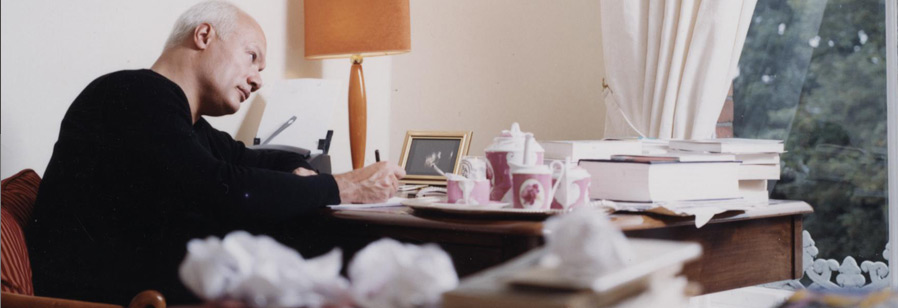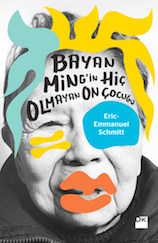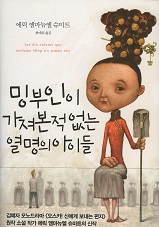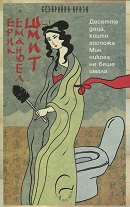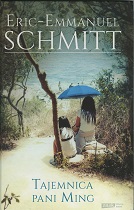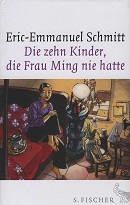Masterclass
Trailers
Monsieur Ibrahim et les Fleurs du Coran
x (x)
x (x)
x (x)
x (x)
x (x)
x (x)
View all trailers
- Home
- Literature
- Narratives
Les dix enfants que madame Ming n'a jamais eus
Summary
Part VI in the Cycle de l'Invisible.
Out on 5th April 2012.
Madam Ming likes to talk about her ten children, who live scattered across China's vast land mass. Is she making it up, in the country of the only child? Has she circumvented the law? Has she gone quietly mad? Could it be that her offspring is a figment of her imagination?
Madam Ming's amazing secret echoes the secrets of China past and China present, enlightened by the timeless wisdom of Confucius. The Ten Children that Madam Ming Never Had is the sixth novella in the series Le Cycle de l'Invisible and follows Oscar and the Lady in Pink, Mr Ibrahim and the Flowers of the Koran, and Noah's Child.
Publications
- In Italian, published by Edizioni E/O
Eric-Emmanuel Schmitt continues his “Cycle de l’invisible” with The Ten Children Madam Ming never had, a fable inspired by the wisdom of Confucius.
Eric-Emmanuel Schmitt, the theatre director, is on sparkling form. The delighted new proprietor of the Théâtre Rive Gauche, on the Rue de la Gaîté in the Montparnasse district of Paris, is immensely proud of his new baby. In a fortnight’s time, Francis Lalanne will be his Monsieur Ibrahim in a re-run of what has become one of the most frequently performed plays in the world. And Schmitt himself, replacing his friend Francis in concert, will appear on stage nine times this spring. It’s a lifelong dream come true: the dream of having his very own theatre and it gives him another role to play in addition to novelist, playwright, producer and essayist. At a mere 52, this French-born Belgian resident has been translated into 43 languages. Now, to his Cycle de l’invisible, five novellas on childhood and spirituality (Milarepa, Monsieur Ibrahim and the Flowers of the Koran, Oscar and the Lady in Pink, Noah’s Child and The Sumo Wrestler Who Could Not Get Fat), he has added a new book. In The Ten Children Madam Ming Never Had, a subtle and touching book whose heroine, a bathroom attendant in the basement of a grand hotel, tells a chance Westerner all about her children who may or may not exist, Schmitt proves again his exceptional talent as a cipher and storyteller.
In the story of Madam Ming and her ten children, you tackle Confucianism. Is Confucius relevant in 2012?
My first impulse was to tell the tragedy of a Chinese mother who can’t have children and who deals with that tragedy by inventing the lives of the children her country has forbidden her to have. It’s a crazy story and I found the wisdom for it in Confucius, who has a whole philosophy on the family to offer. It’s a way of trying to decipher the Chinese mystery: for two thousand six hundred years, neither political variations, nor the shift to a market economy, nor any historical avatar have shifted the country’s cornerstone of Confucianism, which is key to the Chinese soul. The Chinese are a people who have accepted the everlasting nature of Confucianism in the invisible rather than the visible. In the West, we have cathedrals in the middle of our cities, but Christianity has withdrawn. We have open-air Roman amphitheatres, but it’s a very long time since anyone used them. In Chinese civilization, there’s next to no stone left but the underlying principles remain, because they are passed on from person to person.
This book adds a sixth chapter to your series, the “Cycle de l’invisible”, the first of which was Milarepa in 1997. Is it in keeping with an initial plan?
Not at all! The idea of the series took root in Switzerland. A journalist was interviewing me about Milarepa, which had just been set for stage at the Théâtre de Vidy-Lausanne, and he was surprised to learn that I wasn’t a Buddhist when I’d written a novella about Buddhism. As though you’ve got to be black to be anti-racist! I thought that was interesting and worth pursuing: a thoughtful discussion about a spirituality that is not my own without being evangelical or critical. So, the project became a major piece of research into the treasures of “the invisible”, which the religions or spiritualities represent – they’re a way of making sense of life: the invisible can create order out of the visible. I began by looking at the religions – Christianity, Islam, Judaism – then spirituality, with Zen Buddhism and Tibetan Buddhism. Madam Ming is an embellishment, because this time, the story deals with a wisdom, a philosophy of the world.
What does the writer’s work in each of these little fables consist of?
These short stories – moral fables that aren’t moralizing – require infinite work. I polish them endlessly before I get to the essence. They all take me years while I wait for the wisdom to become my own territory. I’ve been absorbing Confucianism for so long that it’s virtually become Schmitt-ism! When the material’s ready to be regurgitated, the actual writing takes me a few weeks, and then one of my main concerns is for the work to hide the work, for the reader to be unaware of the artistry behind the artistry. It’s a painstaking task and I love it! My grandfather was a crimper. I used to spend hours watching him doing something nobody else even noticed. I’ve got a book in my head about African animism, one of the most difficult things for us Europeans to imagine. I’ve been struggling to imbue the fibres of my mind and heart with it for fifteen years. In one day, it’ll turn into a short 50-page book. The same goes for Greek and Latin myths: polytheism doesn’t exist any more – it’s just a display of statues – but it’s something I understand in the depths of my being and which I share.
Would you say each book contributes to a great contemporary bazaar of spirituality: they can all be taken off the shelf for use like in a supermarket but you won’t get happiness from them?
It’s a feature of the modern era that we have more freedom to seek answers to existential questions than we actually ask. It’s a freedom that can panic some people. For me, the opposite is true: I’m in awe of human beings and their capacity for spiritual and philosophical invention. I feel as though I’m uncovering gold dust, rather than stumbling because I’m being led astray from my basic beliefs. And it’s not all so unfamiliar: Confucius’ search for the happy medium is also fundamental to Western culture because, at the same period in the Mediterranean Basin, Aristotle was drawing the same conclusions, preaching the same will to get by without transcendence and developing a political theory independent of religious authority. I’m looking for the universal core beneath diversity, what every culture recognizes as wisdom.
So, are all spiritualities equal in your view?
No, the point is the search for wisdom. What I admire in every civilization is the effort to overcome egoism, to reach out to other people and live in harmony with them, the effort to drag oneself out of the mire. We’re all brothers when it comes to questions. It’s our answers that set us apart from one another and sometimes set us against one another, but that’s why I’m always keen to go back to the question. Afterwards, for me personally, the answers don’t all have the same weight. I’ve always claimed, quite simply, that Christianity is my house and is what sustains me and governs a part of my life.
That’s a paradox, isn’t it? Readers of your “Cycle de l’invisible” come looking for answers and you always give them more questions...
Learning to live with questions that will only ever have temporary answers is my recurring message. That’s what philosophy is: it’s about refining one’s art of asking questions and being able to live with a plethora of possible answers. I’ve done my utmost not to be ignorant, but all I’ve come up with are answers to banal questions, like “Where’s my phone?” or “What are we having for dinner tonight?” Anything do to with the meaning of life and death, I’ve not got any answers to. You’ve got to agree to live in “perhaps mode” without suffering on account of it. Because that doubt can lead to anxiety, suicide or that other form of brain-death, fanaticism, which is a desperate over-compensation for doubt.
That’s a position light years away from the role of “guru” people have sometimes tried to impose on you...
I’ve rejected all the guru positions people have tried to put me into! I’m not someone who wants their answer to go viral. With me, meet-the-author sessions in bookshops very often turn into coffeehouse philosophy lessons because people ask me spiritual questions, but I answer honestly, wearing my philosopher’s hat, that truth is inaccessible.
What are the interesting temporary answers you find in Confucius through your heroine, Madam Ming?
In the first place, a kind of apologia of resistance, like the grass that bends in the wind but stands back up as soon as it can. What a Westerner could see as cowardice or hypocrisy is dignity which takes its time and accepts temporary humiliation. And also the fact that mutual understanding is more important than truth: living together is more important than knowledge of the truth, and virtue is not true but right. Which goes against the tyranny of transparency we’re currently subjected to, under the influence of the Anglo-Saxon world. Finally, I’m very affected by the concern for the happy medium: not confusing vengeance with justice; the struggle against disproportion and pride.
Do you think, in the course of your life and your books, that you yourself have grown wiser?
Like anyone, I try to become wiser. Sometimes, I think I’m getting there, but maybe it’s just one more illusion! I can’t say any more than anyone else, but as a philosopher and a writer, I have more time to consider the questions I ask and to study other people’s answers before it’s my turn to pass them on.
The Ten Children Madam Ming Never Had by Eric-Emmanuel Schmitt. Albin Michel, 116 p.
Interview with Isabelle Falconnier for L'Hebdo.
